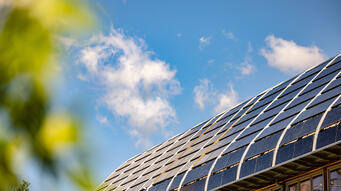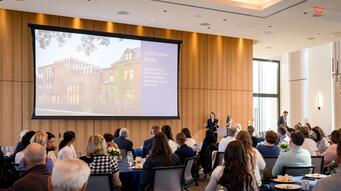Built Environment
Buildings that Improve the Quality of Life
According to the US Environmental Protection Agency, the average American spends nearly 90% of his or her lifetime indoors. Yale is committed to ensuring healthy living and working environments for people working, living, studying and visiting our buildings.
Yale’s Efforts
- Yale’s standards for new construction and renovations address energy and water efficiency, access to natural light and use of nontoxic materials.
- Since 2009, Yale has been committed to LEED Gold certification for all comprehensive scope construction projects and to using Yale’s Sustainable Design Requirements for smaller scope projects. Since 2010, Yale has invested $1.3 billion dollars towards projects that meet these Requirements.
- Yale is testing a Carbon Charge to assess if price signals can motivate building occupants to save energy.
What You Can Do
- We want to optimize how and when we condition our buildings. Use buildings during operating hours and avoid heating and cooling spaces unnecessarily.
- Green certify your workspace, laboratory, or next event to help save energy, water, and materials.
Our Objectives and Goals
Transformative Design, Construction, and Maintenance
Develop transformative approaches to project design, construction, and maintenance that address financial, environmental, and social imperatives.
A historic building at the nexus of New Haven’s Dixwell and Beaver Hills neighborhoods is now home to a new “cooling mural” thanks to a partnership between city government, Yale Planetary Solutions, and the Yale Schools of Art, Architecture, and the Environment. The massive mural on the Goffe Street Armory, unveiled in October 2024, is part of an initiative called Public Art as Urban Climate Solutions. The project invited the community’s input on the design of the mural and aims to train local artists in mural making. It helps mitigate the impact of the urban heat island effect: the mural was created with cooling paint technology that reflects UV radiation and lowers surface temperatures—an innovative step toward lessening the effects of heat waves.
High-Performance Design Standards
This goal was achieved in 2019. While LEED Gold remains the minimum requirement for all major Yale projects, we continue to review and update university design standards to guide decision-making on building emissions, efficient operations, healthy buildings, and accessibility, as well as requirements for mechanical equipment, commissioning, indoor air quality, and waste management. To date, Yale has achieved thirty-four LEED Gold and three LEED Platinum certifications. Since 2018, Yale’s LEEDcertified new buildings, on average, modeled 20 to 22 percent energy efficiency gains and reduced water use by 35 percent. Projects employ technology to improve ventilation, air filtration, and contamination risk management; use building products with environmental and health declarations; and specify lowemitting finishes for most projects.
Campus Development Strategy for Carbon Neutrality
This goal was achieved in 2020. Since then, campus decarbonization strategies have accelerated. In 2025 we installed a heat recovery chiller at West Campus to reduce the need for steam from the power plant, began installing a geothermal field as part of Yale’s Upper Science Hill Development, and defined significant energy conservation strategies within five existing buildings that will eventually be served by the geothermal system. Pilot drilling for additional geothermal-based utilities is underway at Lower Hillhouse to further develop our abilities to deliver renewable energy on campus.
Optimal Building Performance
Develop effective approaches to maintenance, operation, and occupancy of buildings that both ensure optimal performance and are responsive to environmental, social, and financial imperatives.
Maintenance, Operations, and Occupancy Standards
By 2025, pilot, document, and apply enhanced high-performance standards and protocols for maintenance and operations that integrate sustainability for all Yale-owned and operated energy-intensive buildings.
The Campus Stewardship Department has completed Facilities Condition Assessments (FCA) at the Yale Medical School, as well as in four academic areas on Central Campus, to help prioritize maintenance and renovation needs. We are also implementing a standardized Capital Planning and Management System to capture and manage FCA data more effectively. In 2025, the university also added a process to utilize this data for improved space-use planning.
Enhanced Space Use Policy
By 2019, develop and adopt a University policy for efficient use of campus space that improves utilization of buildings and facilities by identifying and reducing redundancies and excess capacity.
This goal was achieved in 2019 as guidance for workspace and classroom utilization was developed. The work has since evolved as the university undertakes a broader effort to reassess and redefine its approach to space utilization, leveraging sophisticated data management systems to improve decision-making and optimize the use of campus space.







